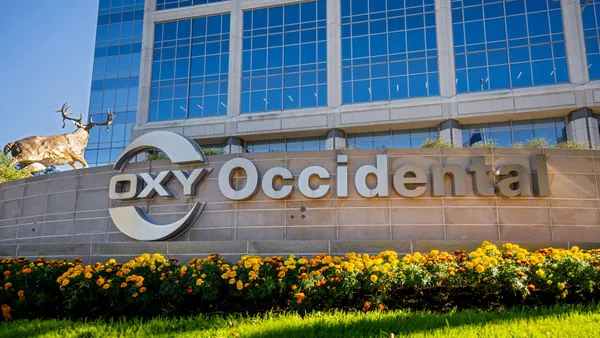Dive Brief:
- Goldman Sachs is leaving Climate Action 100+, joining several financial services institutions who exited the investor engagement group earlier this year amid heightened scrutiny surrounding ESG and climate initiatives.
- A Goldman spokesperson confirmed the departure of its asset management arm from CA100+ to ESG Dive over email. The spokesperson said the firm has made investments in its “ability to meet the sustainable investing needs of [its] clients” and remains dedicated to “leveraging [its] global capabilities.”
- The firm’s exit, first reported on Friday, comes just a few days after the House Judiciary Committee sent letters to over 130 U.S.-based companies, retirement systems and government pension funds that are members of CA100+, inquiring about their involvement in the group. Goldman was also a recipient of a House Judiciary letter.
Dive Insight:
CA100+ confirmed Goldman’s departure to ESG Dive on Friday, stating the group would “continue to support investors globally as they act on climate-related financial risks and opportunities.”
“We welcome Goldman Sachs’ continuing commitment to maintain its sustainable investing work through its global capabilities and look forward to seeing the ongoing impact of this,” a spokesperson for the group wrote in an emailed statement.
However, the spokesperson added that the ongoing politicization of its initiative, and climate stewardship in general, was “regrettable.”
CA100+ advocates for curbing the carbon footprint of the world’s largest corporate greenhouse gas emitters and focuses on engaging companies to improve their climate change governance, slash emissions and strengthen climate-related financial disclosures to “create long-term shareholder value,” according to its website. The group, which now comprises over 700 investors, initially launched as a five-year initiative in 2017 but announced plans to extend its remit to 2030 last year.
JPMorgan Asset Management and State Street Global Advisors announced they were departing CA100+ in February, while BlackRock said it was downgrading its membership to a smaller international arm. This exodus also spurred exits from other high-profile financial institutions in the following months, including the Pacific Investment Management Company and Invesco.
JPMorgan previously told ESG Dive its withdrawal from the group was due to the development of its own climate risk engagement framework. However, State Street said the coalition’s enhanced priorities for members were not in line with its independent decision-making.
These priorities were part of the “phase 2” requirements the climate coalition announced in June 2023, which asked signatories to enhance their corporate disclosure and implement climate transition plans — an add-on to its original push for companies to make climate-related disclosures. The second phase also requires participating investors to submit an annual schedule of engagement specifying the climate action and escalation strategies they intend to implement.
These requirements were also the subject of the House Judiciary Committee’s inquiry into the climate coalition in July. In letters sent to over 130 CA100+ members, the committee inquired about how the entities in question planned on incorporating the group’s “phase 2” requirements.












